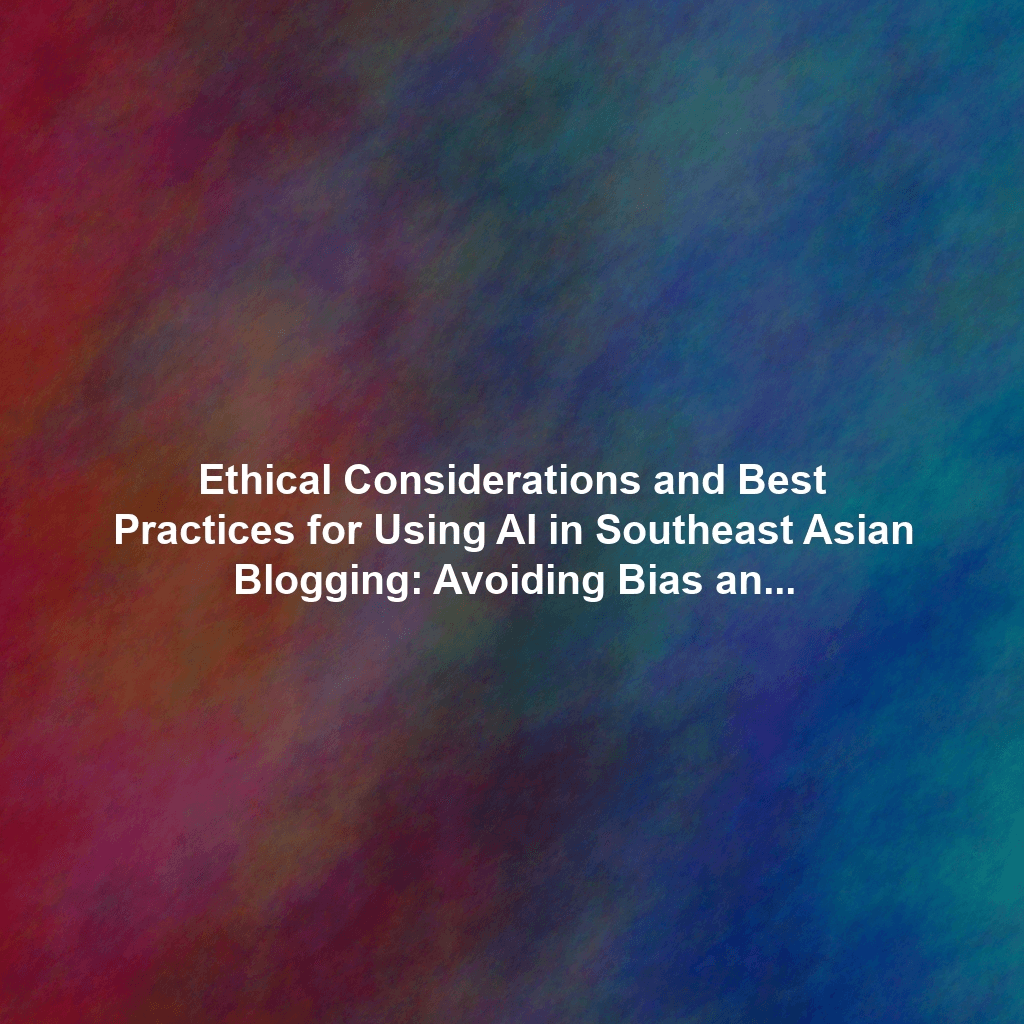Artificial intelligence (AI) is rapidly transforming the blogging landscape, particularly in diverse and dynamic markets like Southeast Asia. AI-powered blogging tools offer incredible potential for content creation, optimization, and audience engagement. However, with great power comes great responsibility. This article delves into the crucial ethical considerations surrounding AI’s use in Southeast Asian blogging, focusing on mitigating bias, preventing misinformation, and upholding the highest standards of accuracy and credibility. It’s designed to provide actionable guidelines for responsible AI adoption, ensuring that technology serves to enrich rather than undermine the region’s online discourse.
The Rise of AI Blogging in Southeast Asia: Opportunities and Challenges
Southeast Asia is a melting pot of cultures, languages, and perspectives. As internet access expands and digital literacy grows, blogging is becoming an increasingly vital platform for sharing stories, fostering dialogue, and driving economic growth. AI-powered tools can empower bloggers in the region by:
- Generating content ideas: AI can identify trending topics and niche opportunities specific to Southeast Asian audiences.
- Streamlining content creation: AI can assist with writing, editing, and optimizing blog posts.
- Improving SEO: AI can analyze keywords and optimize content for search engines, boosting visibility.
- Personalizing user experience: AI can tailor content recommendations and interactions based on individual preferences.
However, these benefits are accompanied by significant challenges. The algorithms that power AI tools are trained on vast datasets, which may contain biases that reflect societal inequalities. If left unchecked, these biases can perpetuate harmful stereotypes, spread misinformation, and undermine trust in online content.
Ethical Implications of AI-Generated Content in Southeast Asia
Using AI to generate blog content presents several ethical dilemmas, particularly in a region with a rich and complex history like Southeast Asia:
Bias and Discrimination
AI models can inadvertently perpetuate biases related to ethnicity, religion, gender, and other sensitive attributes. For example, an AI trained primarily on Western data might struggle to accurately represent the nuances of Southeast Asian cultures or may promote stereotypes that are harmful to certain communities. Content about specific ethnic groups might unintentionally reinforce existing prejudices if not carefully vetted.
Misinformation and “Fake News”
AI models can generate plausible but factually incorrect information. This is particularly concerning in a region where misinformation can spread rapidly through social media and other online channels. AI-generated content, even if unintentional, can contribute to the erosion of trust and fuel social division.
Plagiarism and Copyright Infringement
AI models are trained on existing content, which raises concerns about plagiarism and copyright infringement. While AI tools are often designed to generate original text, there is a risk that they may inadvertently copy or paraphrase copyrighted material. This can have serious legal and reputational consequences.
Lack of Transparency and Accountability
It can be difficult to understand how AI models arrive at their outputs. This lack of transparency makes it challenging to identify and correct biases or errors. Furthermore, it can be difficult to hold individuals or organizations accountable for the content generated by AI tools.
Best Practices for Responsible AI Blogging in Southeast Asia
To mitigate these ethical risks, bloggers in Southeast Asia should adopt the following best practices:
Human Oversight is Paramount
AI should be viewed as a tool to assist human writers, not replace them. Human oversight is essential to ensure accuracy, fairness, and cultural sensitivity. Always review and edit AI-generated content carefully before publishing.
Rigorous Fact-Checking
Never rely solely on AI-generated information. Always verify facts and claims using reliable sources. Be particularly vigilant about information related to sensitive topics such as politics, religion, and history.
Diversify Data Sources
Be aware of the potential biases in AI models. If possible, choose AI tools that are trained on diverse datasets that accurately represent Southeast Asian cultures and perspectives. Encourage AI developers to address biases in their models.
Promote Transparency and Disclosure
Be transparent about your use of AI in content creation. Consider disclosing when AI has been used to generate or assist with writing a blog post. This helps build trust with your audience and allows them to evaluate the content with appropriate context. A simple disclaimer such as “This article was written with the assistance of AI, and edited by a human editor” can suffice.
Engage with Your Audience
Encourage readers to provide feedback and report errors or biases in your content. Actively respond to comments and address concerns promptly. Use audience feedback to improve the quality and accuracy of your blog.
Prioritize Local Knowledge and Expertise
Southeast Asia is incredibly diverse. AI, even with vast datasets, might miss the nuances of local contexts. Engage local experts and community members to review content related to specific regions or communities. This ensures accuracy and cultural sensitivity.
Be Mindful of Language and Nuance
AI-generated content might not always capture the subtleties of language and cultural expression. Pay close attention to tone, phrasing, and cultural references to ensure that your content is appropriate and respectful. Consider having content translated or reviewed by native speakers.
Future Considerations for AI in Southeast Asian Blogging
As AI technology continues to evolve, it is crucial to:
- Develop ethical guidelines and standards specifically for AI-powered blogging in Southeast Asia.
- Promote research on the ethical implications of AI in the region.
- Educate bloggers and content creators about responsible AI use.
- Foster collaboration between AI developers, researchers, and policymakers to address ethical challenges.
Conclusion
AI offers tremendous opportunities for bloggers in Southeast Asia to create more engaging, informative, and impactful content. However, it is essential to use AI responsibly and ethically. By prioritizing human oversight, rigorous fact-checking, and cultural sensitivity, bloggers can harness the power of AI while upholding the highest standards of accuracy, fairness, and trust. As the digital landscape continues to evolve, a commitment to ethical AI practices will be crucial for building a vibrant and inclusive online community in Southeast Asia.
 Skip to content
Skip to content

